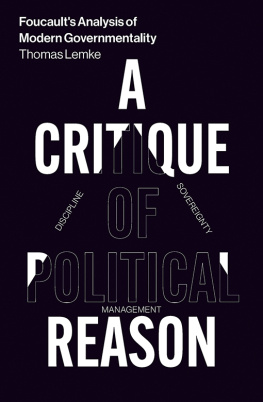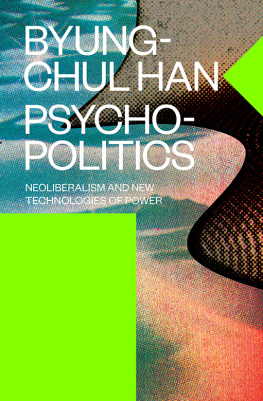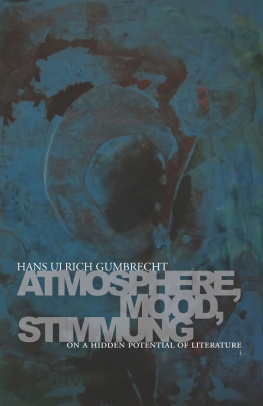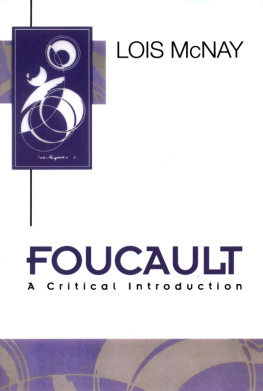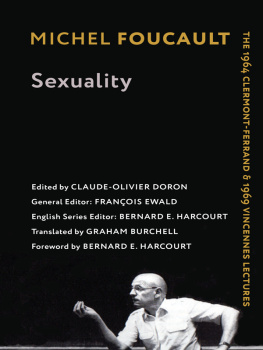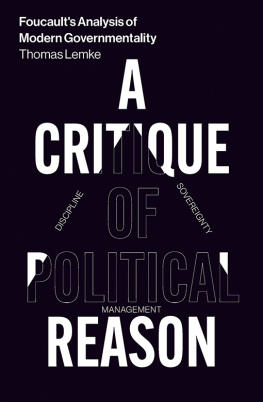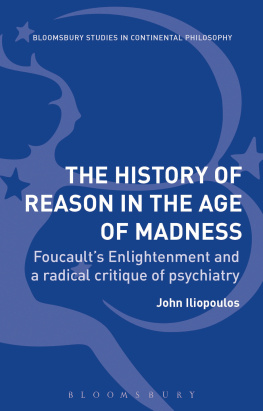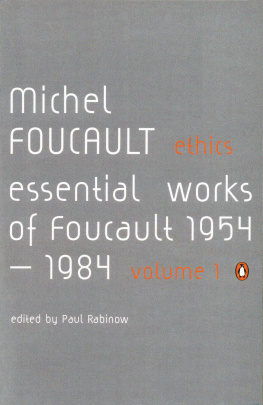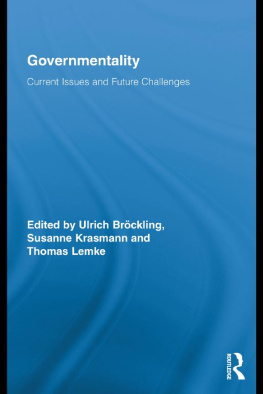Contents

Foucaults Analysis of
Modern Governmentality
Foucaults Analysis of
Modern Governmentality
A Critique of Political Reason
Thomas Lemke
Translated by Erik Butler

This English-language edition first published by Verso 2019
Originally published in German as Eine Kritik der politischen Vernunft
Foucaults Analyse der modernen Gouvernementalitt
Thomas Lemke 2019
Translation Erik Butler 2019
This translation of this work was funded by Geisteswissenschaften International Translation Funding for Work in the Humanities and Social Sciences from Germany, a joint initiative of the Fritz Thyssen Foundation, the German Federal Foreign Office, the collecting society VG WORT and the Brsenverein des Deutschen Buchhandels (German Publishers & Booksellers Association)
All rights reserved
The moral rights of the author have been asserted
1 3 5 7 9 10 8 6 4 2
Verso
UK: 6 Meard Street, London W1F 0EG
US: 20 Jay Street, Suite 1010, Brooklyn, NY 11201
versobooks.com
Verso is the imprint of New Left Books
ISBN-13: 978-1-78663-645-4
ISBN-13: 978-1-78873-251-2 (HBK)
ISBN-13: 978-1-78663-643-0 (UK EBK)
ISBN-13: 978-1-78663-644-7 (US EBK)
British Library Cataloguing in Publication Data
A catalogue record for this book is available from the British Library
Library of Congress Cataloging-in-Publication Data
Names: Lemke, Thomas, author.
Title: A critique of political reason : Foucaults analysis of modern governmentality / Thomas Lemke ; translated by Erik Butler.
Other titles: Kritik der politischen Vernunft. English
Description: London ; Brooklyn, NY : Verso, 2019. | Includes bibliographical references.
Identifiers: LCCN 2018032852| ISBN 9781786636454 (paperback) | ISBN 9781786636447 (us ebook)
Subjects: LCSH: Foucault, Michel, 1926-1984Political and social views. | Political sciencePhilosophy. | BISAC: POLITICAL SCIENCE / History & Theory. | POLITICAL SCIENCE / Political Ideologies / Communism & Socialism. | POLITICAL SCIENCE / Political Ideologies / Democracy.
Classification: LCC JC261.F68 L4513 2019 | DDC 320.01dc23
LC record available at https://lccn.loc.gov/2018032852
Typeset in Minion Pro by MJ&N Gavan, Truro, Cornwall
Printed in the UK by CPI Mackays
A moral system, with axioms, corollaries, and iron logic, and reliable application to every moral dilemma that is what is demanded of philosophers. [] A philosopher who hesitates to make such a profession is all the more energetically required to deliver a general principle. If thought does not simply reaffirm the prevalent rules, it must appear yet more self-assured, universal, and authoritative than if it had merely justified what was already in force. You consider the prevailing power unjust; would you rather have no power at all, but chaos? [] What people cannot endure is the attempt to evade the either/or, the mistrust of abstract principles, steadfastness without a doctrine.
Horkheimer and Adorno, Dialectics of Enlightenment
One must pass to the other side the good side but in order to extract oneself from these mechanisms which make two sides appear, in order to dissolve the false unity, the illusionary nature of this other side with which we have taken sides.
Foucault, Non au sexe roi
Contents
Introduction. Paradoxes, Contradictions, Aporias:
The Order of Discourse as the Discourse of Order
The Government of Society:
The Invention of the Social
Forty years ago, Michel Foucault coined the neologism governmentality (gouvernementalit) in his lectures at the Collge de France of 1978 and 1979. The term is derived from the French adjective gouvernemental, meaning concerning government. In the lectures, Foucault mobilizes an older understanding of the term. While the word has a purely political meaning today, he shows that up until well into the eighteenth century the problem of government was placed in a more general context. Government was a term discussed not only in political tracts but also in philosophical, religious, medical and pedagogic texts. In addition to management by the state or administration, government also addressed problems of self-control, guidance for the family and for children, management of the household, and directing the soul. Foucault proposes this broad understanding of government that does not conceive of subjectivation and state formation as two independent and separate processes but analyses them from a single analytical perspective, focusing on the rationalities and technologies of governing human beings. In the 1978 lectures Foucault traces the genealogy of governmentality from classical Greek and Roman days, via early Christian pastoral guidance, up to state reason and police science, while the 1979 lectures focus on the study of liberal and neo-liberal forms of government.
For a long time, what Foucault himself called a history of governmentality remained largely unknown. The only relevant material he authorized for publication was the talk of 1 February 1978 and two short summaries of the lectures findings. The complete lecture series at the Collge de France from 1978 and 1979 were only published in 2004, and appeared in English translation some years later. Despite this extremely difficult editorial situation, Foucaults work on governmentality received a lot of scholarly attention across a large variety of disciplines. The publication of the collection The Foucault Effect: Studies in Governmentality in 1991 was a significant event in this respect. This volume, co-edited by Graham Burchell, Colin Gordon and Peter Miller, presented translations into English of the already published 1978 lecture and some other important texts by Foucault. It also made available articles by researchers directly affiliated with Foucault (Daniel Defert, Franois Ewald, Jacques Donzelot, Robert Castel, Pasquale Pasquino and Giovanna Procacci) and by scholars from an Anglo-Saxon background like Colin Gordon, Graham Burchell and Ian Hacking. The Foucault Effect marked the beginning of a huge interest in Foucaults concept of governmentality. In the following years, many studies in Great Britain, Australia, New Zealand, the United States and Canada took their inspiration from Foucaults work on government to analyse contemporary social and political transformations.
The growing interest in governmentality studies was grounded in both theory and politics. From the 1990s onwards, many radical intellectuals turned to Foucauldian concepts as they had become increasingly dissatisfied with classical forms of critique and analysis that too often relied on dogmatic political-economic approaches or reductionist concepts of ideology as false consciousness. Alongside such altered intellectual and theoretical constellations, interest in Foucaults concept of governmentality also stemmed from the collective experience of (welfare) state regulatory models and instruments being displaced by forms of neoliberal government. Studies of governmentality analyse the social dissemination of market-driven solutions and entrepreneurial patterns not as a diminishing or reduction of state sovereignty but as a restructuring of governmental techniques and the rearticulation of identities and subjectivities. Instead of operating with dichotomies such as power and subjectivity, state and society, ideas and practices, they look for the systematic ties between rationalities and technologies of government. Finally, studies of governmentality have opened up an epistemological-political field that Foucault defined as the politics of truth, investigating the discursive operations and institutional mechanisms through which truth claims are generated and distributed and the power effects tied to these truths.

